Critical Evaluation of the impacts of Global Financial Crisis and the ongoing Quantitative Easing Monetary Policy in Greece
VerifiedAdded on 2023/06/15
|10
|1809
|390
AI Summary
This article evaluates the impact of global financial crisis on Greece, its major import and export items, 10 year trend analysis, threats and opportunities to trade and investment, and the Heckscher-Ohlin trade theory to justify present and future trade outlook of Greece.
Contribute Materials
Your contribution can guide someone’s learning journey. Share your
documents today.
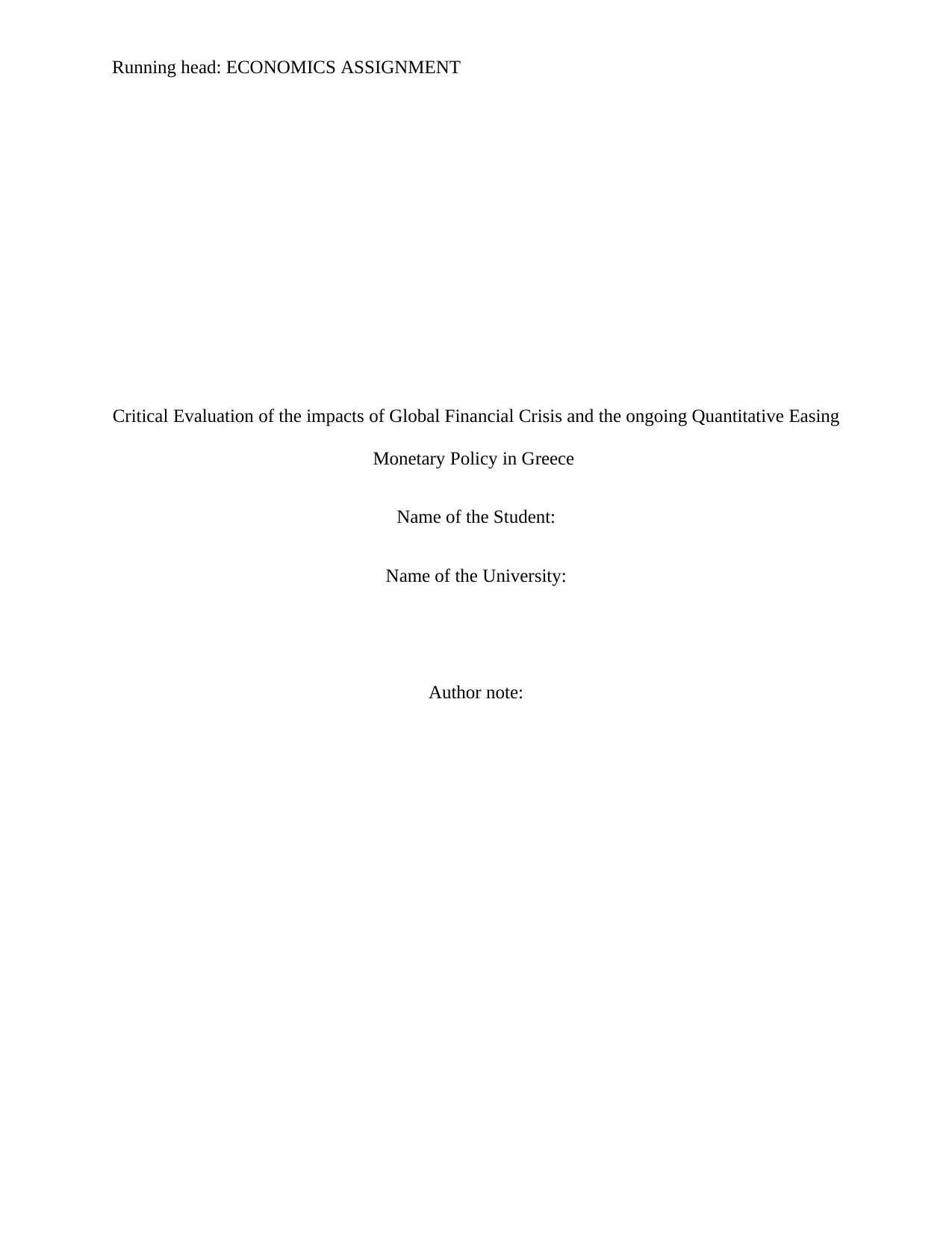
Running head: ECONOMICS ASSIGNMENT
Critical Evaluation of the impacts of Global Financial Crisis and the ongoing Quantitative Easing
Monetary Policy in Greece
Name of the Student:
Name of the University:
Author note:
Critical Evaluation of the impacts of Global Financial Crisis and the ongoing Quantitative Easing
Monetary Policy in Greece
Name of the Student:
Name of the University:
Author note:
Secure Best Marks with AI Grader
Need help grading? Try our AI Grader for instant feedback on your assignments.
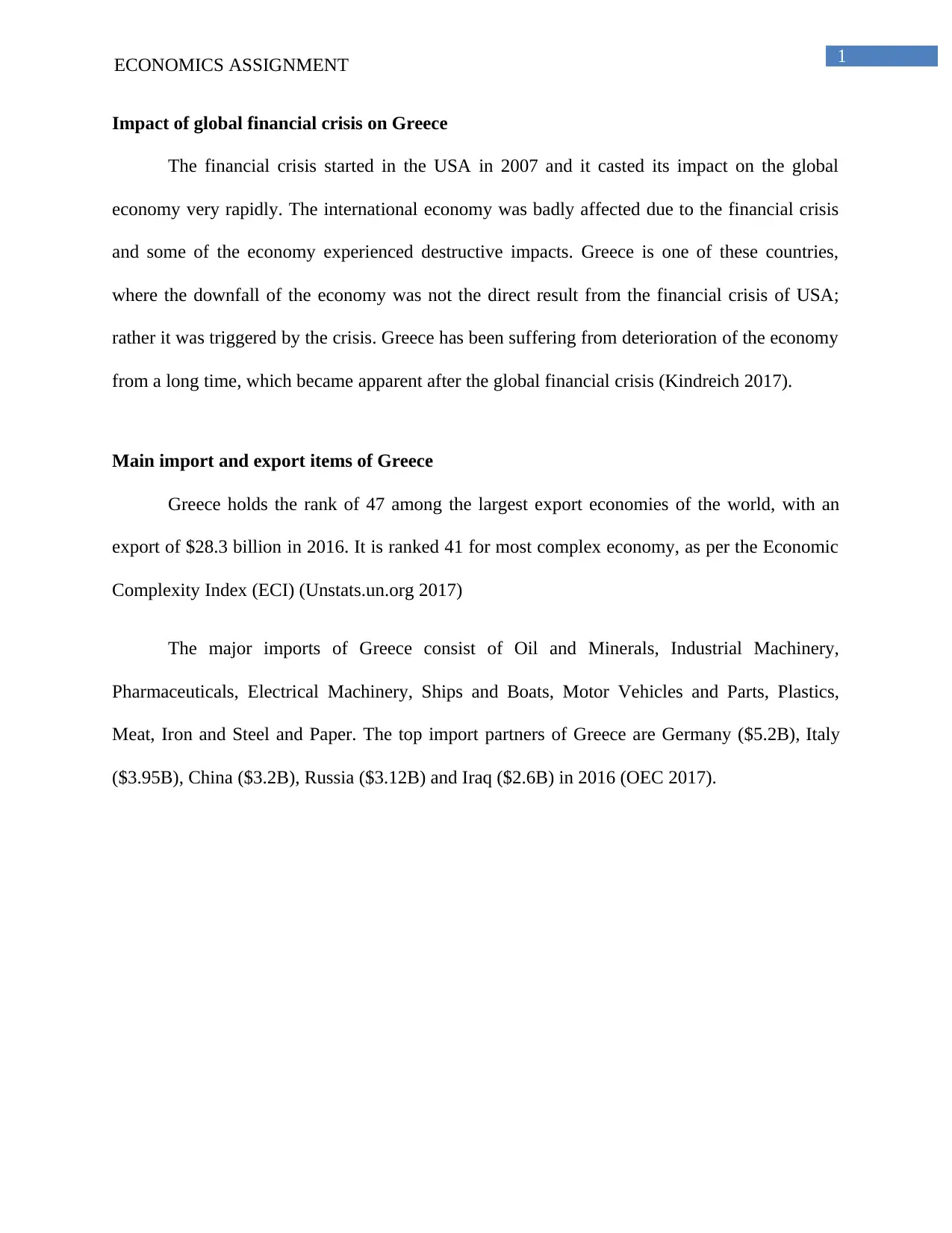
1ECONOMICS ASSIGNMENT
Impact of global financial crisis on Greece
The financial crisis started in the USA in 2007 and it casted its impact on the global
economy very rapidly. The international economy was badly affected due to the financial crisis
and some of the economy experienced destructive impacts. Greece is one of these countries,
where the downfall of the economy was not the direct result from the financial crisis of USA;
rather it was triggered by the crisis. Greece has been suffering from deterioration of the economy
from a long time, which became apparent after the global financial crisis (Kindreich 2017).
Main import and export items of Greece
Greece holds the rank of 47 among the largest export economies of the world, with an
export of $28.3 billion in 2016. It is ranked 41 for most complex economy, as per the Economic
Complexity Index (ECI) (Unstats.un.org 2017)
The major imports of Greece consist of Oil and Minerals, Industrial Machinery,
Pharmaceuticals, Electrical Machinery, Ships and Boats, Motor Vehicles and Parts, Plastics,
Meat, Iron and Steel and Paper. The top import partners of Greece are Germany ($5.2B), Italy
($3.95B), China ($3.2B), Russia ($3.12B) and Iraq ($2.6B) in 2016 (OEC 2017).
Impact of global financial crisis on Greece
The financial crisis started in the USA in 2007 and it casted its impact on the global
economy very rapidly. The international economy was badly affected due to the financial crisis
and some of the economy experienced destructive impacts. Greece is one of these countries,
where the downfall of the economy was not the direct result from the financial crisis of USA;
rather it was triggered by the crisis. Greece has been suffering from deterioration of the economy
from a long time, which became apparent after the global financial crisis (Kindreich 2017).
Main import and export items of Greece
Greece holds the rank of 47 among the largest export economies of the world, with an
export of $28.3 billion in 2016. It is ranked 41 for most complex economy, as per the Economic
Complexity Index (ECI) (Unstats.un.org 2017)
The major imports of Greece consist of Oil and Minerals, Industrial Machinery,
Pharmaceuticals, Electrical Machinery, Ships and Boats, Motor Vehicles and Parts, Plastics,
Meat, Iron and Steel and Paper. The top import partners of Greece are Germany ($5.2B), Italy
($3.95B), China ($3.2B), Russia ($3.12B) and Iraq ($2.6B) in 2016 (OEC 2017).
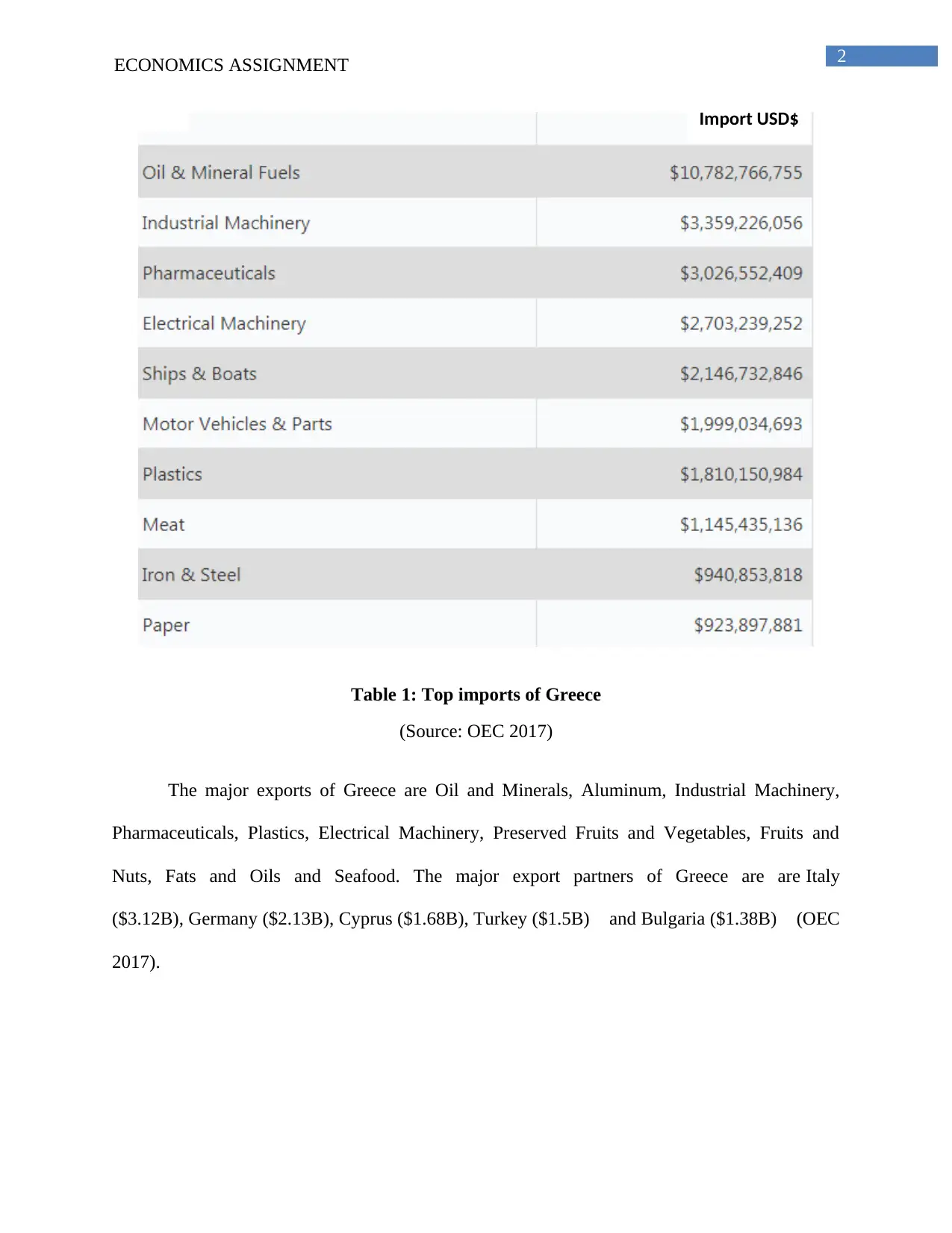
2ECONOMICS ASSIGNMENT
Table 1: Top imports of Greece
(Source: OEC 2017)
The major exports of Greece are Oil and Minerals, Aluminum, Industrial Machinery,
Pharmaceuticals, Plastics, Electrical Machinery, Preserved Fruits and Vegetables, Fruits and
Nuts, Fats and Oils and Seafood. The major export partners of Greece are are Italy
($3.12B), Germany ($2.13B), Cyprus ($1.68B), Turkey ($1.5B) and Bulgaria ($1.38B) (OEC
2017).
Import USD$
Table 1: Top imports of Greece
(Source: OEC 2017)
The major exports of Greece are Oil and Minerals, Aluminum, Industrial Machinery,
Pharmaceuticals, Plastics, Electrical Machinery, Preserved Fruits and Vegetables, Fruits and
Nuts, Fats and Oils and Seafood. The major export partners of Greece are are Italy
($3.12B), Germany ($2.13B), Cyprus ($1.68B), Turkey ($1.5B) and Bulgaria ($1.38B) (OEC
2017).
Import USD$
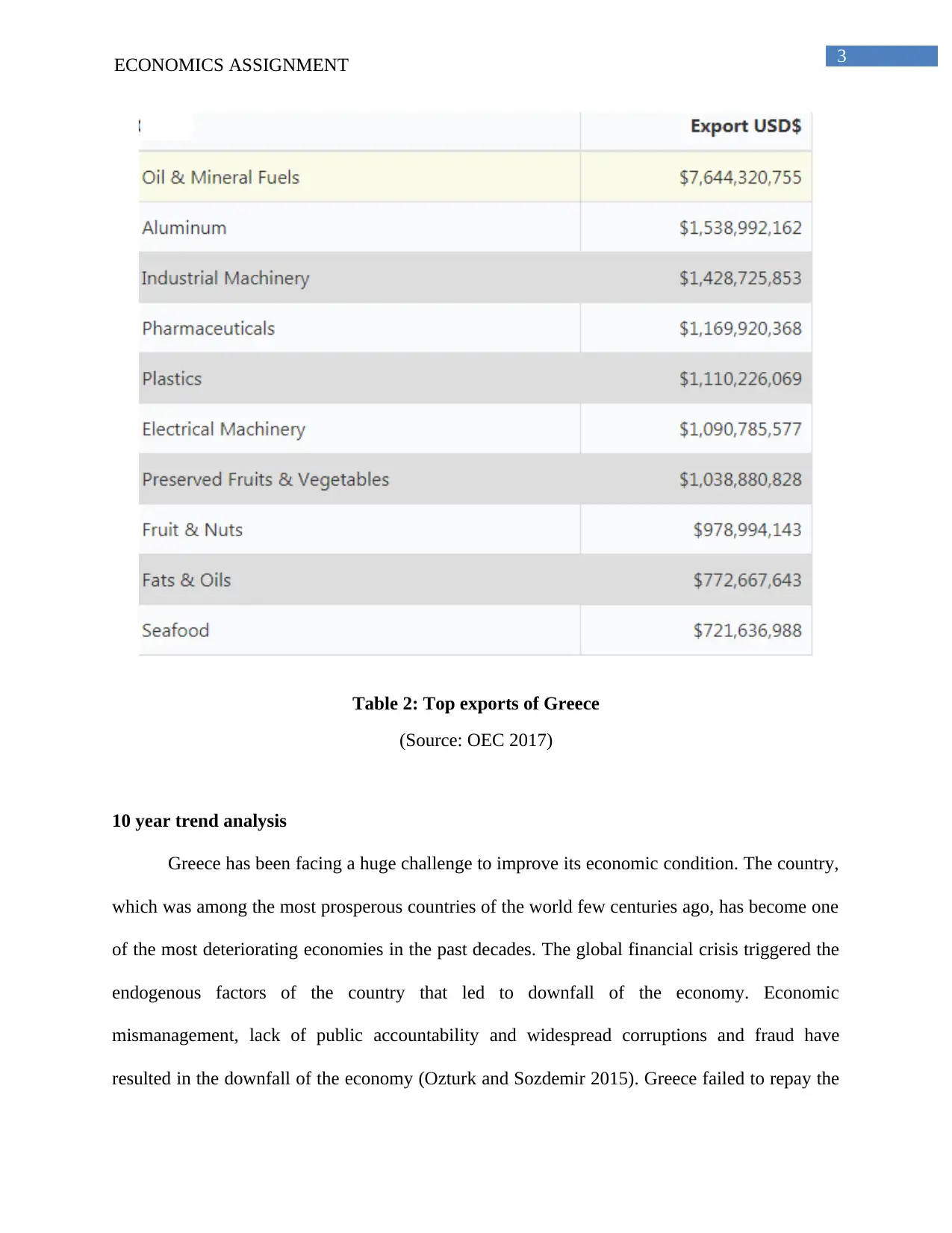
3ECONOMICS ASSIGNMENT
Table 2: Top exports of Greece
(Source: OEC 2017)
10 year trend analysis
Greece has been facing a huge challenge to improve its economic condition. The country,
which was among the most prosperous countries of the world few centuries ago, has become one
of the most deteriorating economies in the past decades. The global financial crisis triggered the
endogenous factors of the country that led to downfall of the economy. Economic
mismanagement, lack of public accountability and widespread corruptions and fraud have
resulted in the downfall of the economy (Ozturk and Sozdemir 2015). Greece failed to repay the
Table 2: Top exports of Greece
(Source: OEC 2017)
10 year trend analysis
Greece has been facing a huge challenge to improve its economic condition. The country,
which was among the most prosperous countries of the world few centuries ago, has become one
of the most deteriorating economies in the past decades. The global financial crisis triggered the
endogenous factors of the country that led to downfall of the economy. Economic
mismanagement, lack of public accountability and widespread corruptions and fraud have
resulted in the downfall of the economy (Ozturk and Sozdemir 2015). Greece failed to repay the
Secure Best Marks with AI Grader
Need help grading? Try our AI Grader for instant feedback on your assignments.
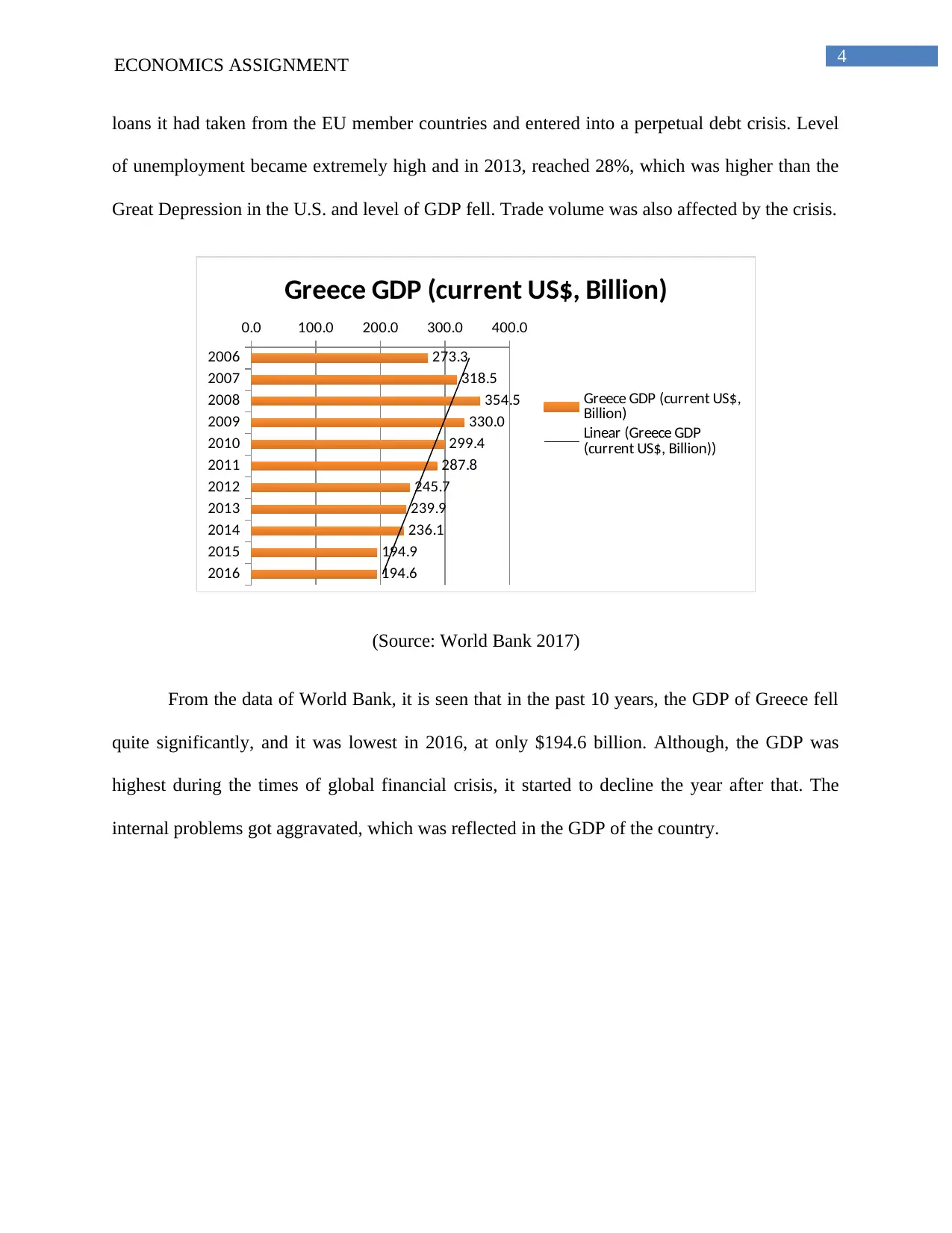
4ECONOMICS ASSIGNMENT
loans it had taken from the EU member countries and entered into a perpetual debt crisis. Level
of unemployment became extremely high and in 2013, reached 28%, which was higher than the
Great Depression in the U.S. and level of GDP fell. Trade volume was also affected by the crisis.
2006
2007
2008
2009
2010
2011
2012
2013
2014
2015
2016
0.0 100.0 200.0 300.0 400.0
273.3
318.5
354.5
330.0
299.4
287.8
245.7
239.9
236.1
194.9
194.6
Greece GDP (current US$, Billion)
Greece GDP (current US$,
Billion)
Linear (Greece GDP
(current US$, Billion))
(Source: World Bank 2017)
From the data of World Bank, it is seen that in the past 10 years, the GDP of Greece fell
quite significantly, and it was lowest in 2016, at only $194.6 billion. Although, the GDP was
highest during the times of global financial crisis, it started to decline the year after that. The
internal problems got aggravated, which was reflected in the GDP of the country.
loans it had taken from the EU member countries and entered into a perpetual debt crisis. Level
of unemployment became extremely high and in 2013, reached 28%, which was higher than the
Great Depression in the U.S. and level of GDP fell. Trade volume was also affected by the crisis.
2006
2007
2008
2009
2010
2011
2012
2013
2014
2015
2016
0.0 100.0 200.0 300.0 400.0
273.3
318.5
354.5
330.0
299.4
287.8
245.7
239.9
236.1
194.9
194.6
Greece GDP (current US$, Billion)
Greece GDP (current US$,
Billion)
Linear (Greece GDP
(current US$, Billion))
(Source: World Bank 2017)
From the data of World Bank, it is seen that in the past 10 years, the GDP of Greece fell
quite significantly, and it was lowest in 2016, at only $194.6 billion. Although, the GDP was
highest during the times of global financial crisis, it started to decline the year after that. The
internal problems got aggravated, which was reflected in the GDP of the country.
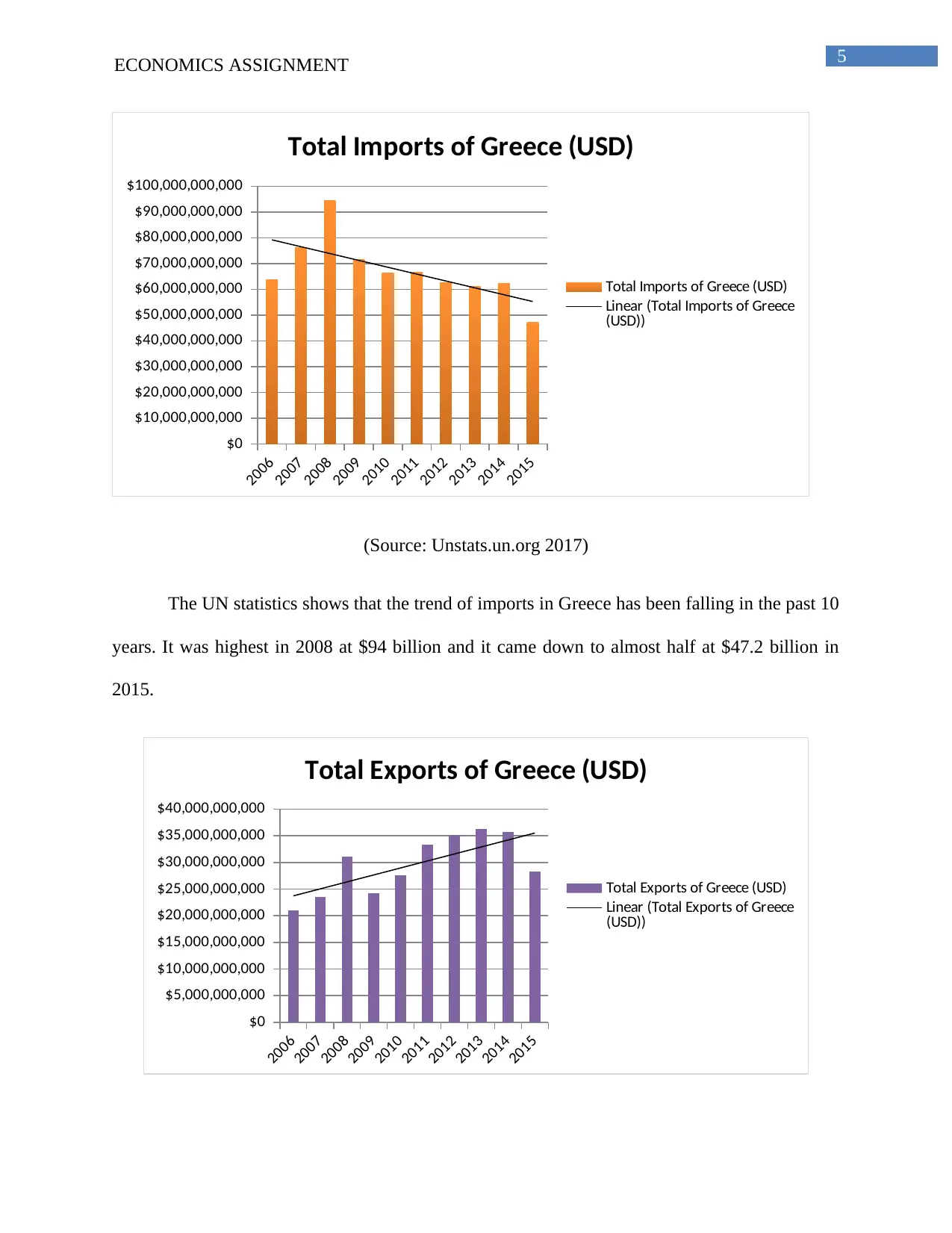
5ECONOMICS ASSIGNMENT
2006
2007
2008
2009
2010
2011
2012
2013
2014
2015
$0
$10,000,000,000
$20,000,000,000
$30,000,000,000
$40,000,000,000
$50,000,000,000
$60,000,000,000
$70,000,000,000
$80,000,000,000
$90,000,000,000
$100,000,000,000
Total Imports of Greece (USD)
Total Imports of Greece (USD)
Linear (Total Imports of Greece
(USD))
(Source: Unstats.un.org 2017)
The UN statistics shows that the trend of imports in Greece has been falling in the past 10
years. It was highest in 2008 at $94 billion and it came down to almost half at $47.2 billion in
2015.
2006
2007
2008
2009
2010
2011
2012
2013
2014
2015
$0
$5,000,000,000
$10,000,000,000
$15,000,000,000
$20,000,000,000
$25,000,000,000
$30,000,000,000
$35,000,000,000
$40,000,000,000
Total Exports of Greece (USD)
Total Exports of Greece (USD)
Linear (Total Exports of Greece
(USD))
2006
2007
2008
2009
2010
2011
2012
2013
2014
2015
$0
$10,000,000,000
$20,000,000,000
$30,000,000,000
$40,000,000,000
$50,000,000,000
$60,000,000,000
$70,000,000,000
$80,000,000,000
$90,000,000,000
$100,000,000,000
Total Imports of Greece (USD)
Total Imports of Greece (USD)
Linear (Total Imports of Greece
(USD))
(Source: Unstats.un.org 2017)
The UN statistics shows that the trend of imports in Greece has been falling in the past 10
years. It was highest in 2008 at $94 billion and it came down to almost half at $47.2 billion in
2015.
2006
2007
2008
2009
2010
2011
2012
2013
2014
2015
$0
$5,000,000,000
$10,000,000,000
$15,000,000,000
$20,000,000,000
$25,000,000,000
$30,000,000,000
$35,000,000,000
$40,000,000,000
Total Exports of Greece (USD)
Total Exports of Greece (USD)
Linear (Total Exports of Greece
(USD))
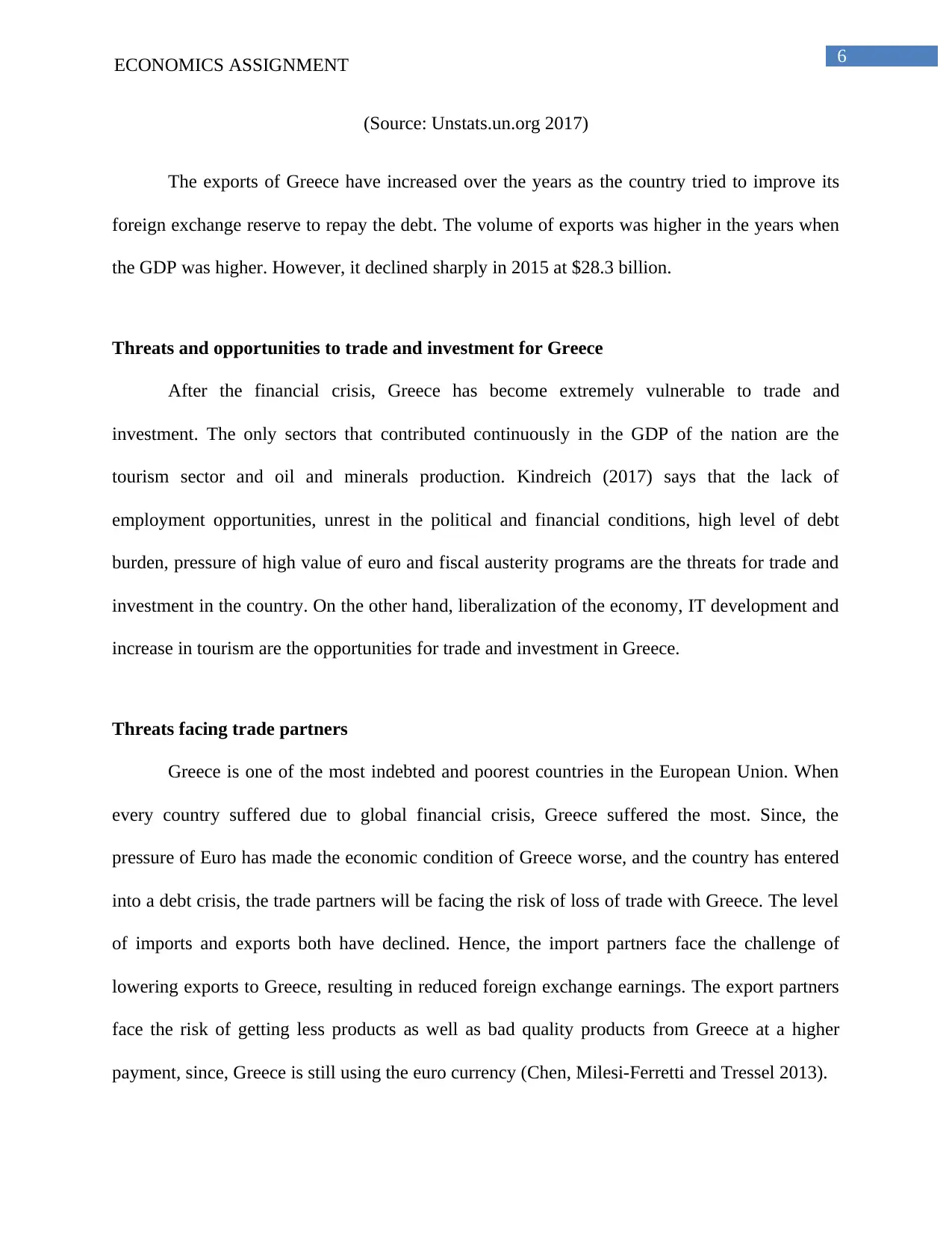
6ECONOMICS ASSIGNMENT
(Source: Unstats.un.org 2017)
The exports of Greece have increased over the years as the country tried to improve its
foreign exchange reserve to repay the debt. The volume of exports was higher in the years when
the GDP was higher. However, it declined sharply in 2015 at $28.3 billion.
Threats and opportunities to trade and investment for Greece
After the financial crisis, Greece has become extremely vulnerable to trade and
investment. The only sectors that contributed continuously in the GDP of the nation are the
tourism sector and oil and minerals production. Kindreich (2017) says that the lack of
employment opportunities, unrest in the political and financial conditions, high level of debt
burden, pressure of high value of euro and fiscal austerity programs are the threats for trade and
investment in the country. On the other hand, liberalization of the economy, IT development and
increase in tourism are the opportunities for trade and investment in Greece.
Threats facing trade partners
Greece is one of the most indebted and poorest countries in the European Union. When
every country suffered due to global financial crisis, Greece suffered the most. Since, the
pressure of Euro has made the economic condition of Greece worse, and the country has entered
into a debt crisis, the trade partners will be facing the risk of loss of trade with Greece. The level
of imports and exports both have declined. Hence, the import partners face the challenge of
lowering exports to Greece, resulting in reduced foreign exchange earnings. The export partners
face the risk of getting less products as well as bad quality products from Greece at a higher
payment, since, Greece is still using the euro currency (Chen, Milesi-Ferretti and Tressel 2013).
(Source: Unstats.un.org 2017)
The exports of Greece have increased over the years as the country tried to improve its
foreign exchange reserve to repay the debt. The volume of exports was higher in the years when
the GDP was higher. However, it declined sharply in 2015 at $28.3 billion.
Threats and opportunities to trade and investment for Greece
After the financial crisis, Greece has become extremely vulnerable to trade and
investment. The only sectors that contributed continuously in the GDP of the nation are the
tourism sector and oil and minerals production. Kindreich (2017) says that the lack of
employment opportunities, unrest in the political and financial conditions, high level of debt
burden, pressure of high value of euro and fiscal austerity programs are the threats for trade and
investment in the country. On the other hand, liberalization of the economy, IT development and
increase in tourism are the opportunities for trade and investment in Greece.
Threats facing trade partners
Greece is one of the most indebted and poorest countries in the European Union. When
every country suffered due to global financial crisis, Greece suffered the most. Since, the
pressure of Euro has made the economic condition of Greece worse, and the country has entered
into a debt crisis, the trade partners will be facing the risk of loss of trade with Greece. The level
of imports and exports both have declined. Hence, the import partners face the challenge of
lowering exports to Greece, resulting in reduced foreign exchange earnings. The export partners
face the risk of getting less products as well as bad quality products from Greece at a higher
payment, since, Greece is still using the euro currency (Chen, Milesi-Ferretti and Tressel 2013).
Paraphrase This Document
Need a fresh take? Get an instant paraphrase of this document with our AI Paraphraser
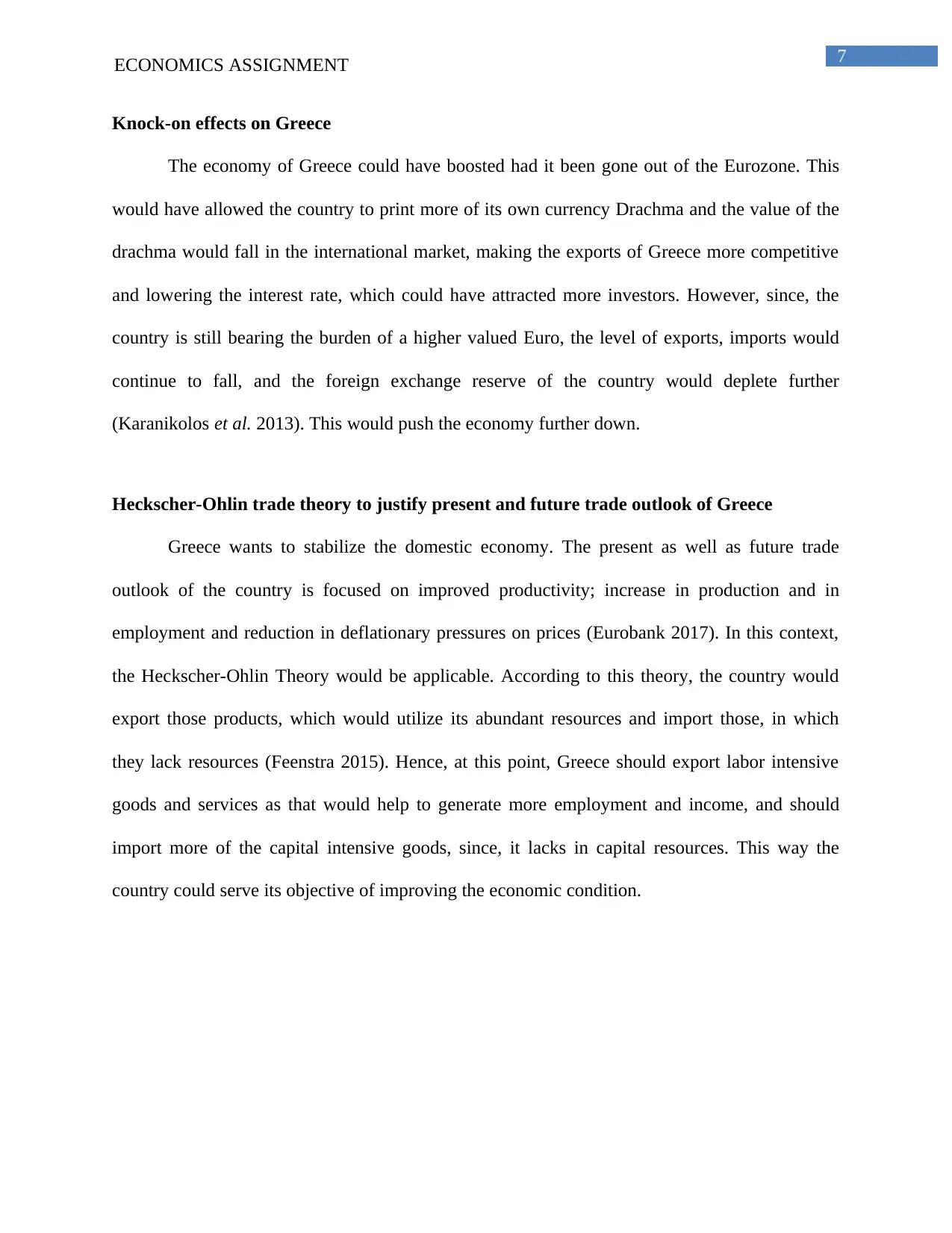
7ECONOMICS ASSIGNMENT
Knock-on effects on Greece
The economy of Greece could have boosted had it been gone out of the Eurozone. This
would have allowed the country to print more of its own currency Drachma and the value of the
drachma would fall in the international market, making the exports of Greece more competitive
and lowering the interest rate, which could have attracted more investors. However, since, the
country is still bearing the burden of a higher valued Euro, the level of exports, imports would
continue to fall, and the foreign exchange reserve of the country would deplete further
(Karanikolos et al. 2013). This would push the economy further down.
Heckscher-Ohlin trade theory to justify present and future trade outlook of Greece
Greece wants to stabilize the domestic economy. The present as well as future trade
outlook of the country is focused on improved productivity; increase in production and in
employment and reduction in deflationary pressures on prices (Eurobank 2017). In this context,
the Heckscher-Ohlin Theory would be applicable. According to this theory, the country would
export those products, which would utilize its abundant resources and import those, in which
they lack resources (Feenstra 2015). Hence, at this point, Greece should export labor intensive
goods and services as that would help to generate more employment and income, and should
import more of the capital intensive goods, since, it lacks in capital resources. This way the
country could serve its objective of improving the economic condition.
Knock-on effects on Greece
The economy of Greece could have boosted had it been gone out of the Eurozone. This
would have allowed the country to print more of its own currency Drachma and the value of the
drachma would fall in the international market, making the exports of Greece more competitive
and lowering the interest rate, which could have attracted more investors. However, since, the
country is still bearing the burden of a higher valued Euro, the level of exports, imports would
continue to fall, and the foreign exchange reserve of the country would deplete further
(Karanikolos et al. 2013). This would push the economy further down.
Heckscher-Ohlin trade theory to justify present and future trade outlook of Greece
Greece wants to stabilize the domestic economy. The present as well as future trade
outlook of the country is focused on improved productivity; increase in production and in
employment and reduction in deflationary pressures on prices (Eurobank 2017). In this context,
the Heckscher-Ohlin Theory would be applicable. According to this theory, the country would
export those products, which would utilize its abundant resources and import those, in which
they lack resources (Feenstra 2015). Hence, at this point, Greece should export labor intensive
goods and services as that would help to generate more employment and income, and should
import more of the capital intensive goods, since, it lacks in capital resources. This way the
country could serve its objective of improving the economic condition.
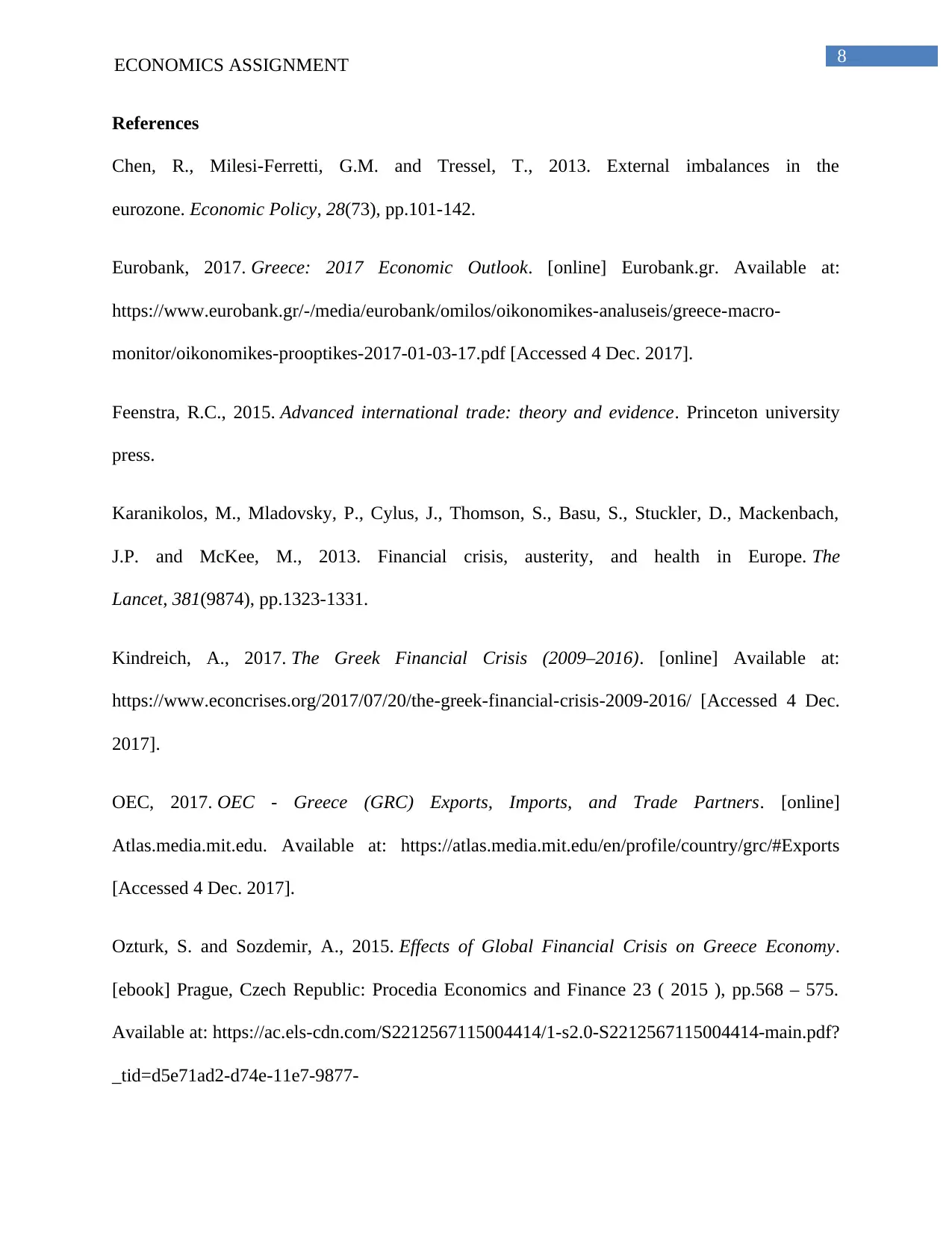
8ECONOMICS ASSIGNMENT
References
Chen, R., Milesi-Ferretti, G.M. and Tressel, T., 2013. External imbalances in the
eurozone. Economic Policy, 28(73), pp.101-142.
Eurobank, 2017. Greece: 2017 Economic Outlook. [online] Eurobank.gr. Available at:
https://www.eurobank.gr/-/media/eurobank/omilos/oikonomikes-analuseis/greece-macro-
monitor/oikonomikes-prooptikes-2017-01-03-17.pdf [Accessed 4 Dec. 2017].
Feenstra, R.C., 2015. Advanced international trade: theory and evidence. Princeton university
press.
Karanikolos, M., Mladovsky, P., Cylus, J., Thomson, S., Basu, S., Stuckler, D., Mackenbach,
J.P. and McKee, M., 2013. Financial crisis, austerity, and health in Europe. The
Lancet, 381(9874), pp.1323-1331.
Kindreich, A., 2017. The Greek Financial Crisis (2009–2016). [online] Available at:
https://www.econcrises.org/2017/07/20/the-greek-financial-crisis-2009-2016/ [Accessed 4 Dec.
2017].
OEC, 2017. OEC - Greece (GRC) Exports, Imports, and Trade Partners. [online]
Atlas.media.mit.edu. Available at: https://atlas.media.mit.edu/en/profile/country/grc/#Exports
[Accessed 4 Dec. 2017].
Ozturk, S. and Sozdemir, A., 2015. Effects of Global Financial Crisis on Greece Economy.
[ebook] Prague, Czech Republic: Procedia Economics and Finance 23 ( 2015 ), pp.568 – 575.
Available at: https://ac.els-cdn.com/S2212567115004414/1-s2.0-S2212567115004414-main.pdf?
_tid=d5e71ad2-d74e-11e7-9877-
References
Chen, R., Milesi-Ferretti, G.M. and Tressel, T., 2013. External imbalances in the
eurozone. Economic Policy, 28(73), pp.101-142.
Eurobank, 2017. Greece: 2017 Economic Outlook. [online] Eurobank.gr. Available at:
https://www.eurobank.gr/-/media/eurobank/omilos/oikonomikes-analuseis/greece-macro-
monitor/oikonomikes-prooptikes-2017-01-03-17.pdf [Accessed 4 Dec. 2017].
Feenstra, R.C., 2015. Advanced international trade: theory and evidence. Princeton university
press.
Karanikolos, M., Mladovsky, P., Cylus, J., Thomson, S., Basu, S., Stuckler, D., Mackenbach,
J.P. and McKee, M., 2013. Financial crisis, austerity, and health in Europe. The
Lancet, 381(9874), pp.1323-1331.
Kindreich, A., 2017. The Greek Financial Crisis (2009–2016). [online] Available at:
https://www.econcrises.org/2017/07/20/the-greek-financial-crisis-2009-2016/ [Accessed 4 Dec.
2017].
OEC, 2017. OEC - Greece (GRC) Exports, Imports, and Trade Partners. [online]
Atlas.media.mit.edu. Available at: https://atlas.media.mit.edu/en/profile/country/grc/#Exports
[Accessed 4 Dec. 2017].
Ozturk, S. and Sozdemir, A., 2015. Effects of Global Financial Crisis on Greece Economy.
[ebook] Prague, Czech Republic: Procedia Economics and Finance 23 ( 2015 ), pp.568 – 575.
Available at: https://ac.els-cdn.com/S2212567115004414/1-s2.0-S2212567115004414-main.pdf?
_tid=d5e71ad2-d74e-11e7-9877-
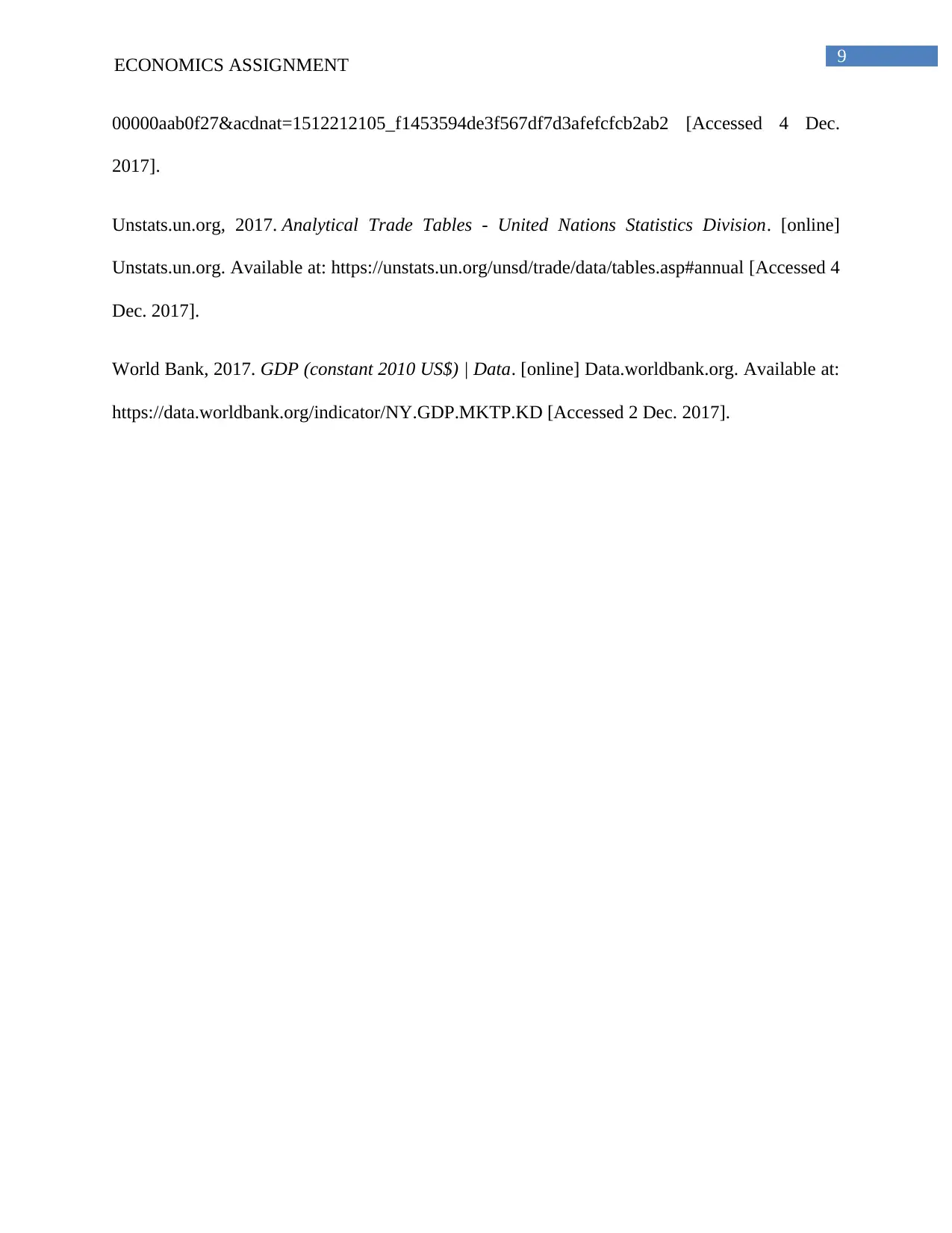
9ECONOMICS ASSIGNMENT
00000aab0f27&acdnat=1512212105_f1453594de3f567df7d3afefcfcb2ab2 [Accessed 4 Dec.
2017].
Unstats.un.org, 2017. Analytical Trade Tables - United Nations Statistics Division. [online]
Unstats.un.org. Available at: https://unstats.un.org/unsd/trade/data/tables.asp#annual [Accessed 4
Dec. 2017].
World Bank, 2017. GDP (constant 2010 US$) | Data. [online] Data.worldbank.org. Available at:
https://data.worldbank.org/indicator/NY.GDP.MKTP.KD [Accessed 2 Dec. 2017].
00000aab0f27&acdnat=1512212105_f1453594de3f567df7d3afefcfcb2ab2 [Accessed 4 Dec.
2017].
Unstats.un.org, 2017. Analytical Trade Tables - United Nations Statistics Division. [online]
Unstats.un.org. Available at: https://unstats.un.org/unsd/trade/data/tables.asp#annual [Accessed 4
Dec. 2017].
World Bank, 2017. GDP (constant 2010 US$) | Data. [online] Data.worldbank.org. Available at:
https://data.worldbank.org/indicator/NY.GDP.MKTP.KD [Accessed 2 Dec. 2017].
1 out of 10
Related Documents
Your All-in-One AI-Powered Toolkit for Academic Success.
+13062052269
info@desklib.com
Available 24*7 on WhatsApp / Email
![[object Object]](/_next/static/media/star-bottom.7253800d.svg)
Unlock your academic potential
© 2024 | Zucol Services PVT LTD | All rights reserved.





